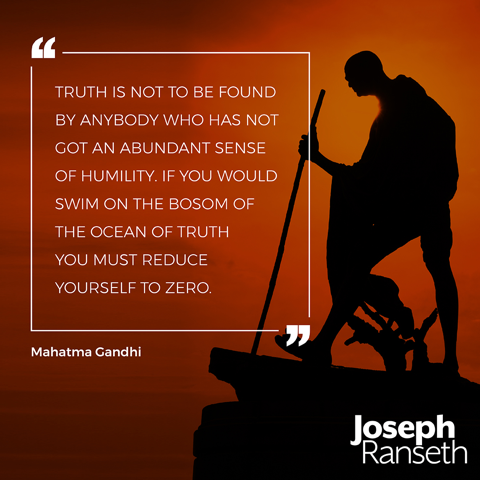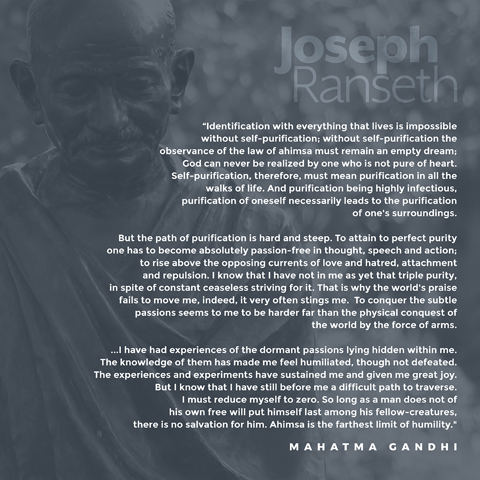When Gandhi went to London to negotiate with the monarchy regarding India’s release, a British journalist asked him: “what is your secret?”
In other words, how does a 90 pound Hindu ascetic with homespun clothes and no shoes bring the largest empire in history to its knees?
Gandhi’s answer was simply 6 words: “I strive to make myself zero.”
By “zero”, Gandhi was referring to arriving at a place of such selfless love that each thought, word and deed was motivated wholly by the welfare and well-being of others, and not for his own gratification. He didn’t claim to have arrived at that place, in fact he often admitted quite the opposite, but he was striving.
I believe this is the missing link in leadership today.
One does not arrive at “zero” without a significant amount of inner work.
It requires letting go of the need for validation and approval (quite a task in today’s social media world), and abandoning the need for self-aggrandizement. This is especially difficult – and now even more important – in our celebrity-centric culture that would have us believe that contribution follows significance, instead of Gandhi’s paradigm: significance is the unsought-for-by-product of contribution.
True leadership seeks contribution, not significance.
And while answering the call to the inner work of self-purification is rare, it is also a prerequisite to creating a change at that scale. We can’t create lasting change by teaching precept alone, we must embody the precepts, and do so in such a way that inspires others to take action.
This is what Gandhi, the great movement maker, called us to do.
What Is A Movement?
Inspiring others to take action that changes paradigms for the better is precisely what a movement is about. It’s not just taking action. It’s about elevating human consciousness.
While the model of what a movement is and does is broad, there are some key things that distinguish a movement from just really good marketing. In my mastermind coaching call today, we discussed 3 central concepts that I feel are crucial to define a movement in today’s modern world:
- It transforms a belief system – whether in an industry, community, culture – from one that currently divides people, to one that unites them. It is the transforming of a belief system that results in action being a by-product. You can’t simply achieve the outcome by changing the outer circumstance alone, you must facilitate the inner shift if the change is to last.
- It’s built on truth. Truth is often tossed about as a buzzword today, and is often viewed as entirely subjective or relative. (My truth vs your truth.) But real truth is just that. It’s true. True principles are self-evident and they affect all people the same, whether they accept them or not. Gravity, for example, is not beholden to party ideologies, religious interpretations, or cultural opinion. Gravity just keeps dropping apples, regardless of our opinion.
- A movement embraces a paradox. Truth transcends a this or that duality and replaces it with this AND that. Take politics, for example. We have opposing sides arguing different sides – one for social responsibility, the other for personal accountability – as if they were mutually exclusive. A movement finds an expression of wholeness where both sides have their place. Instead of fighting over heads vs tails, we start to see that it’s a quarter, and both are parts of a greater whole.
This concept of “Element Zero” is one that we talk about a lot in my private mastermind group (I help thought leaders and heart-centered entrepreneurs start movements) simply because you can’t create change in others until you embody that change within yourself. (For a deeper look at this read: Gandhi did not say Be The Change…)
The Profound Power of Zero
Furthering this concept of becoming zero, here are two quotes that we discussed in our training today.
First, on truth, because it’s essential that our “movements” – whether literal or just our personal impact in daily interactions with others – be based on true principles:
“Truth is not to be found by anybody who has not got an abundant sense of humility. If you would swim on the bosom of the ocean of Truth you must reduce yourself to zero.”

“You must reduce yourself to zero.” – Gandhi quote
Second, the concept of Self-purification. For us to embody this missing leadership link in today’s society, we must adopt a mindset of purification. Doing so helps us identify with all that is – to see the us in them – instead of seeing us versus them, that the media, marketing, and society engender in our minds at nearly every level of every day. (Also explained further in the clarification of Gandhi’s Be The Change quote.)
“Identification with everything that lives is impossible without self-purification; without self-purification the observance of the law of ahimsa must remain an empty dream; God can never be realized by one who is not pure of heart. Self-purification, therefore, must mean purification in all the walks of life. And purification being highly infectious, purification of oneself necessarily leads to the purification of one’s surroundings.
“But the path of purification is hard and steep. To attain to perfect purity one has to become absolutely passion-free in thought, speech and action; to rise above the opposing currents of love and hatred, attachment and repulsion. I know that I have not in me as yet that triple purity, in spite of constant ceaseless striving for it. That is why the world’s praise fails to move me, indeed, it very often stings me.
“To conquer the subtle passions seems to me to be harder far than the physical conquest of the world by the force of arms.
“…I have had experiences of the dormant passions lying hidden within me. The knowledge of them has made me feel humiliated, though not defeated. The experiences and experiments have sustained me and given me great joy. But I know that I have still before me a difficult path to traverse. I must reduce myself to zero. So long as a man does not of his own free will put himself last among his fellow-creatures, there is no salvation for him. Ahimsa is the farthest limit of humility.”

And while the philosophy of what I like to call Element Zero runs deep and profound, the practice of it can be quite simple.
How To Become More Loving: A Simple Hack
Want to cultivate more selfless love – and by so doing have a greater impact – in your life and the world around you? Try this one simple trick:
In each moment throughout the day, ask yourself the question: what can I do right now to serve?
When we cultivate the awareness to ask this question repeatedly throughout the day, miracles start to happen. It will not only transform your own adversities into gifts of service to others, it will have an impact far beyond what you can imagine.
The world is waiting for your contribution to its evolution.
Go ahead, start a movement.

0 Comments